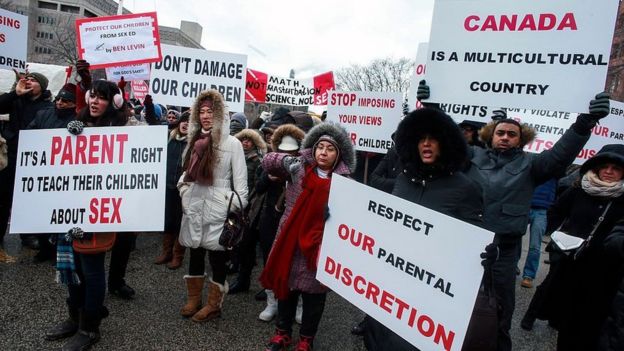Share the post "Canada province cancels new sex-ed curriculum after protests"
A Canadian province has cancelled a controversial sex education curriculum that taught children about gender identity, consent and social media. Newly elected Ontario Premier Doug Ford made good on his promise to cancel the lessons, which sparked protests when it was implemented in 2015. The curriculum was objected to by many who said it was age inappropriate and dismissed family values.
Similar protests over sex ed have happened around the world.Ontario, Canada’s most populous province, introduced a new sex-ed curriculum in 2015 in an attempt to modernise the programme in light of many changes to Canadian society and the growth of social media and sexting.
The last time the curriculum had been updated was 1998. In 2005, same-sex marriage was legalised, and in 2012, Ontario passed a law prohibiting discrimination against transgender people. Meanwhile, the explosion of social media and the ubiquity of mobile phone ownership led to the rise of cyber-bullying, cyber-exploitation and sexting.
Who objected?
Many socially conservative parents said the programme promoted progressive values and usurped their rights as parents to teach their children traditional values about sex and monogamy. Some parents and religious organisations especially objected to parts of the curriculum that taught children about different sexual and gender identities and masturbation. For instance, one lesson plan designed for children around 11 years old suggests describing masturbation as “something that many people do and find pleasurable”.
Other lessons plans for children mention concepts such as sexual orientation, children having two mothers or two fathers, and the idea that not everyone’s gender corresponds with their sex at birth. “The potential for causing serious sexual confusion in the minds of children is very real with this teaching,” wrote the Campaign for Life Coalition, a Christian anti-abortion organisation.The curriculum also taught children about the importance of consent in sex, and about safety online.

Objection did not just come from Catholic and evangelical parents and organisations.
Many new Canadians of Middle Eastern and Asian descent also found the curriculum objectionable, and counter to their culture or religion’s practices. When the curriculum was first announced, it generated fierce protests in many immigrant communities. In Thorncliffe Park, hundreds of parents staged a “strike”, pulling their children from school.
The issue was complicated by politics and prejudice – the head of the governing Liberal Party at the time, Kathleen Wynn, is a lesbian, and some conservatives parents accused her of “pushing her agenda” on families.
What’s next?
Ontario’s education minister announced on Thursday that come the autumn, children will be taught the old, 1998 version of the sex-ed curriculum. The move was praised by opponents of the new programme, but denounced by progressives and members of the LGBT community who accused the premier of caving to homophobia.Skip Twitter post by @teganandsara
When we omit crucial information from the curriculum we are in fact asserting that there is something fundamentally wrong with being LGBTQIA2S. Shame on the government. And shame on anyone who doesn’t get raging angry about our ELECTED officials walking back progress.
Has this debate happened elsewhere?
This is not the first time that sex education has caused controversy. In April, parents across the US kept their children home to protest sex education curriculums in a number of states. They said the curriculums, which varied from state to state, promoted premarital sex and homosexuality. Sex education has long been a hot topic in the US, where only 21 states and the District of Columbia have mandatory curriculums.
In contrast, 26 states have laws that require abstinence to be stressed. Teen pregnancy declined by 8% between 2015-16 in the US, according to the US Centers for Disease Control and Prevention. The CDC attributed the decline to a combination of more young people abstaining from sex or using more contraception.
Still, the CDC notes that America remains first in developed nations for both STIs and teen pregnancy. Sex education was only made mandatory in England in 2017. In primary schools, children would be taught about building healthy relationships and staying safe, while in secondary school it would focus on sex as well as relationships.
The new curriculum also addresses the dangers of sexting, online pornography and sexual harassment. The Safe at School Campaign, run by the Society for the Protection of Unborn Children, described the announcement as a “tragedy”.